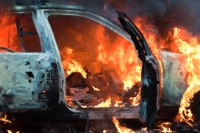Terrorism
Origin
"Terrorism" comes from the French word terrorisme, and originally referred specifically to state terrorism as practiced by the French government during the Reign of terror. The French word terrorisme in turn derives from the Latin verb terreō meaning “I frighten”. The terror cimbricus was a panic and state of emergency in Rome in response to the approach of warriors of the Cimbri tribe in 105 BC. The Jacobins cited this precedent when imposing a Reign of Terror during the French Revolution. After the Jacobins lost power, the word "terrorist" became a term of abuse. Although "terrorism" originally referred to acts committed by a government, currently it usually refers to the killing of innocent people by a non-government group in such a way as to create a media spectacle. This meaning can be traced back to Sergey Nechayev, who described himself as a "terrorist". Nechayev founded the Russian terrorist group "People's Retribution" (Народная расправа) in 1869.
In November 2004, a United Nations Secretary General report described terrorism as any act "intended to cause death or serious bodily harm to civilians or non-combatants with the purpose of intimidating a population or compelling a government or an international organization to do or abstain from doing any act".
Definition
- 1: the systematic use of fear especially as a means of coercion
Description
Terrorism is the systematic use of terror, often violent, especially as a means of coercion. In the international community, however, terrorism has no legally binding, criminal law definition. Common definitions of terrorism refer only to those violent acts which are intended to create fear (terror); are perpetrated for a religious, political, or ideological goal; and deliberately target or disregard the safety of non-combatants (civilians). Some definitions now include acts of unlawful violence and war. The use of similar tactics by criminal organizations for protection rackets or to enforce a code of silence is usually not labeled terrorism, though these same actions may be labeled terrorism when done by a politically motivated group. The writer Heinrich Böll and scholars Raj Desai and Harry Eckstein have suggested that attempts to protect against terrorism may lead to a kind of social oppression.
The word "terrorism" is politically and emotionally charged, and this greatly compounds the difficulty of providing a precise definition. Studies have found over 100 definitions of “terrorism”. The concept of terrorism may be controversial as it is often used by state authorities (and individuals with access to state support) to delegitimize political or other opponents, and potentially legitimize the state's own use of armed force against opponents (such use of force may be described as "terror" by opponents of the state).
Terrorism has been practiced by a broad array of political organizations to further their objectives. It has been practiced by both right-wing and left-wing political parties, nationalistic groups, religious groups, revolutionaries, and ruling governments. An abiding characteristic is the indiscriminate use of violence against noncombatants for the purpose of gaining publicity for a group, cause, or individual. The symbolism of terrorism can leverage human fear to help achieve these goals.
